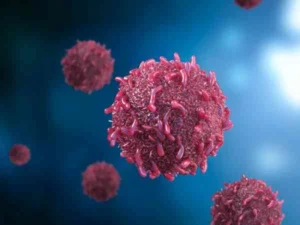Thyroid is a disease caused by lifestyle, of which women are the biggest victims. The thyroid is a butterfly-shaped gland, which produces hormones. It is inside the neck. Thyroid problems arise due to a decrease in the amount of iodine, selenium,and zinc in the body. All these three elements are very important to keep the body healthy. Apart from this, consuming medicine in excess quantity, and having high BP or low BP can cause thyroid problems. In this blog, we will discuss what type of diet should be taken by a person suffering from this disease. We want to give clarity and empower you with information, from the subtle indicators that sometimes go missed to the more noticeable consequences on metabolism.
What is Hypothyroidism?

Hypothyroidism is a medical condition when your thyroid gland doesn’t make enough hormones, which are like body messengers. These hormones control important things like energy and metabolism. The thyroid gland, located in the front of the neck, produces hormones such as thyroxine (T4) and triiodothyronine (T3), which play a crucial role in regulating various metabolic processes in the body. When there’s not enough, you might feel tired, gain weight, or get cold easily. It can happen because of an immune problem, not enough iodine, or other reasons. Luckily, there’s medicine to help, usually a pill you take every day. It’s like giving your body the missing messengers so everything works better.
What Are The Hypothyroidism Symptoms?
Hypothyroidism symptoms generally appear gradually over time, sometimes years. They may include the following:
- Palpitations in the heart
- Blood pressure that is too high
- Slimming down
- Increased hunger
- Menstrual irregularities tiredness thinning hair increased sweating diarrhea trembling and shaking irritability
- Sleep issues
Diet For Hypothyroidism Patient

If you’re dealing with hypothyroidism, a condition where your thyroid gland doesn’t produce enough hormones, making mindful food choices can help manage symptoms and support overall well-being.
- Include Whole Grains: Opt for whole grains like brown rice, quinoa, and oats. Avoid Soy as it increases the chances for hypothyroidism. These provide essential nutrients and fiber, supporting digestion and helping with energy levels.
- Choose Lean Proteins: Include lean protein sources such as chicken, fish, beans, and legumes. Protein is crucial for muscle health and can help boost your metabolism.
- Prioritize Fruits and Vegetables: Load up on colorful fruits and veggies. They are rich in vitamins, minerals, and antioxidants, supporting your immune system and overall health.
- Healthy Fats are Important: Include sources of healthy fats like avocados, nuts, and olive oil. These fats are good for your heart and can help keep your skin and hair healthy.
- Watch Your Iodine Intake: Ensure you get enough iodine but not too much. Seafood, dairy, and iodized salt are good sources. Iodine is vital for thyroid function, but excessive intake may be counterproductive.
- Limit Processed Foods: Minimize processed foods and snacks. They often contain unhealthy fats and additives that can impact your metabolism and overall health.
- Be Mindful of Cruciferous Vegetables: While vegetables like broccoli and cabbage are healthy, it’s advisable to cook them before consuming them. Cooking helps break down compounds that might interfere with thyroid function.
- Stay Hydrated: Drink plenty of water. Staying hydrated supports your metabolism and overall bodily functions.
- Monitor Your Selenium Intake: Include selenium-rich foods like Brazil nuts, sunflower seeds, and whole grains. Selenium is essential for the proper functioning of the thyroid gland. A 400 mcg selenium can be taken.
- Consider Small, Frequent Meals: Instead of three large meals, consider eating smaller, more frequent meals. This can help regulate energy levels and support your metabolism.
Ayurvedic Diet For Hypothyroidism

An underactive thyroid is a kapha disorder, according to Ayurvedic principles. The characteristics of kapha are heavy and sluggish, which correspond to the symptoms of an underactive thyroid. Slow metabolism, also known as manda agni, is typical among kapha people and those with a kapha imbalance.
- Turmeric Milk is The Most Effective Treatment: Thyroid sufferers should drink turmeric milk on a regular basis. Turmeric is really beneficial in thyroid treatment.
- Make Use of Ashwagandha: Before going to bed, mix one scoop of Ashwagandha powder with a glass of warm milk. You may drink its root if you boil it in water. It corrects the hormonal imbalance.
- Muleti: The major ingredient in licorice is triterpenoid glycyrrhetinic acid, which is beneficial to thyroid sufferers.
- Tulsi: Tulsi will cure the thyroid as well as boost immunity. The thyroid can be treated with a half spoon of aloe vera juice and two spoons of basil (Tulsi) juice.
Foods That Will Control Thyroid
- Include bottle gourd in your diet: Consumption of bottle gourd is best for thyroid patients. Thyroid patients should consume Locki on an empty stomach. Eating bottled gourd reduces stress, it contains more water which helps keep the body cool. Consumption of bottled gourd is also considered very beneficial for diabetic patients.
- black pepper: Black pepper is the best treatment for thyroid patients. You can consume small amounts of black pepper in your food regularly. Piperine is present in black pepper and it also has anti-depressant properties which help people in relieving tension and depression. Bone pain can be relieved by its consumption.
- Cocoa butter: Coconut oil offers several health advantages. This oil can also help with weight reduction and conditions like diabetes. Cooking with coconut oil is recommended for thyroid sufferers.
Home Remedies For Hypothyroidism

In thyroid patients, water hyacinth (jalkumbhi) and drumstick should be used. It raises the quantity of iodine, which is one of the variables responsible for the sickness, according to Allopathy.
If a thyroid patient has swelling all over their body, it is best to consume dhaniya and jeer for a faster recovery.
Conclusion
Hypothyroidism is a medical condition when your thyroid gland doesn’t make enough hormones, which are like body messengers. These hormones control important things like energy and metabolism. Controlling hypothyroidism requires a multimodal strategy that combines medicinal intervention with lifestyle changes.
Medication is still important, but the importance of a well-balanced diet high in critical nutrients and conscious decisions cannot be stressed. Thyroid function is ensured by regular monitoring and open discussion with healthcare providers. Individuals suffering from hypothyroidism can find their way to better health by adopting the above-mentioned diet approach. Remember that each person’s experience is unique, and tailored treatment is critical to reaching balance.







